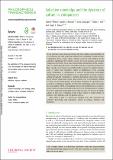Files in this item
Collective knowledge and the dynamics of culture in chimpanzees
Item metadata
| dc.contributor.author | Whiten, Andrew | |
| dc.contributor.author | Harrison, Rachel Anne | |
| dc.contributor.author | McGuigan, Nicola | |
| dc.contributor.author | Vale, Gillian Louise | |
| dc.contributor.author | Watson, Stuart Kyle | |
| dc.date.accessioned | 2021-12-14T09:30:02Z | |
| dc.date.available | 2021-12-14T09:30:02Z | |
| dc.date.issued | 2022-01-31 | |
| dc.identifier | 277073242 | |
| dc.identifier | 83c756ba-7469-474b-8742-6f8ebf62769e | |
| dc.identifier | 34894742 | |
| dc.identifier | 85122383157 | |
| dc.identifier | 000729479600013 | |
| dc.identifier.citation | Whiten , A , Harrison , R A , McGuigan , N , Vale , G L & Watson , S K 2022 , ' Collective knowledge and the dynamics of culture in chimpanzees ' , Philosophical Transactions of the Royal Society B: Biological Sciences , vol. 377 , no. 1843 , 20200321 . https://doi.org/10.1098/rstb.2020.0321 | en |
| dc.identifier.issn | 0962-8436 | |
| dc.identifier.uri | https://hdl.handle.net/10023/24506 | |
| dc.description | Funding: The core research projects reviewed were supported by grant no. ID40128 from the John Templeton Foundation, USA, to A.W. and K. Laland. S.K.W. was supported by NCCR Evolving Language, Swiss National Science Foundation agreement no. 51NF40_180888. | en |
| dc.description.abstract | Social learning in non-human primates has been studied experimentally for over 120 years, yet until the present century this was limited to what one individual learns from a single other. Evidence of group-wide traditions in the wild then highlighted the collective context for social learning, and broader ‘diffusion experiments’ have since demonstrated transmission at the community level. In the present article, we describe and set in comparative perspective three strands of our recent research that further explore the collective dimensions of culture and cumulative culture in chimpanzees. First, exposing small communities of chimpanzees to contexts incorporating increasingly challenging, but more rewarding tool use opportunities revealed solutions arising through the combination of different individuals' discoveries, spreading to become shared innovations. The second series of experiments yielded evidence of conformist changes from habitual techniques to alternatives displayed by a unanimous majority of others but implicating a form of quorum decision-making. Third, we found that between-group differences in social tolerance were associated with differential success in developing more complex tool use to exploit an increasingly inaccessible resource. We discuss the implications of this array of findings in the wider context of related studies of humans, other primates and non-primate species. | |
| dc.format.extent | 9 | |
| dc.format.extent | 588069 | |
| dc.language.iso | eng | |
| dc.relation.ispartof | Philosophical Transactions of the Royal Society B: Biological Sciences | en |
| dc.subject | Chimpanzee | en |
| dc.subject | Innovation | en |
| dc.subject | Collective knowledge | en |
| dc.subject | Social learning | en |
| dc.subject | Culture | en |
| dc.subject | Cumulative culture | en |
| dc.subject | QL Zoology | en |
| dc.subject | BF Psychology | en |
| dc.subject | MCC | en |
| dc.subject.lcc | QL | en |
| dc.subject.lcc | BF | en |
| dc.title | Collective knowledge and the dynamics of culture in chimpanzees | en |
| dc.type | Journal item | en |
| dc.contributor.sponsor | John Templeton Foundation | en |
| dc.contributor.institution | University of St Andrews. School of Psychology and Neuroscience | en |
| dc.identifier.doi | 10.1098/rstb.2020.0321 | |
| dc.description.status | Peer reviewed | en |
| dc.identifier.grantnumber | 40128 | en |
This item appears in the following Collection(s)
Items in the St Andrews Research Repository are protected by copyright, with all rights reserved, unless otherwise indicated.

